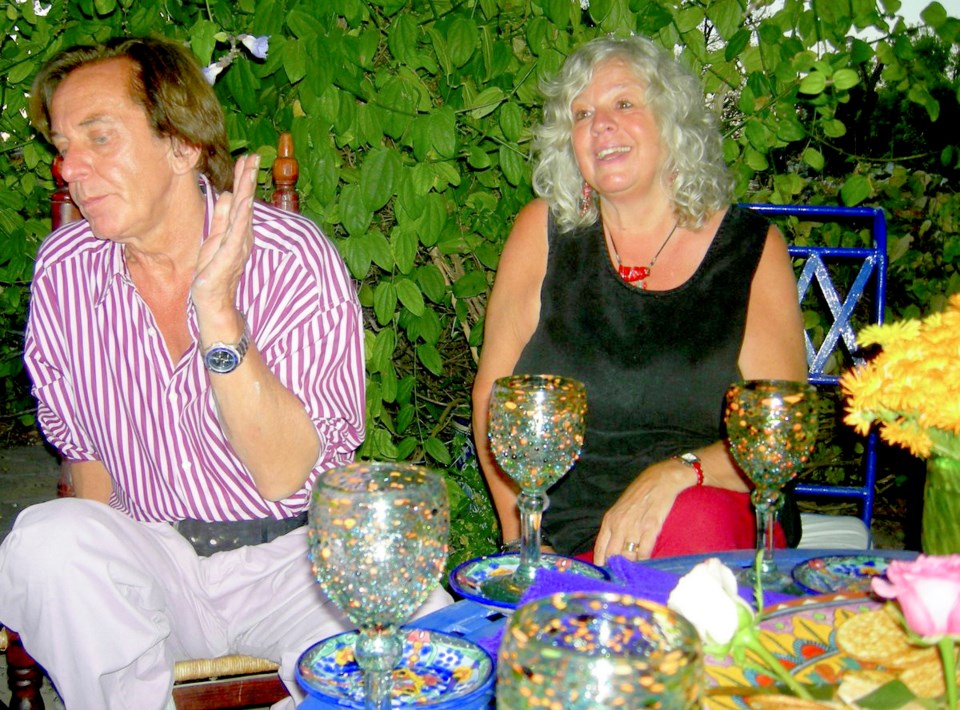It was this winter’s gift to Toller Cranston. Each winter we come to San Miguel with a gift; always something sweet. Toller loved sweets. Real Canadian maple syrup for Toller’s famous breakfasts seemed like a good idea.
And then the news, leaping out from the message box on my computer. Toller gone.Unthinkable.
No more conversations over breakfast that inevitably spiral into brilliant and uncharted territory. No more hearing about how he’d need a ‘Valium drip’ to get through whatever crisis loomed on his horizon. No more of those treasured moments when we might find him alone in the kitchen on a Sunday morning, lounging in bare feet, reading a book, then getting to spend two uninterrupted hours talking with him: about our lives, our foibles, our fears. No more dinners with cakes and roses and candies strewn across the tabletop, towers of ice cream topped with a single pink rose. No more lying in bed late at night, laughing until the tears came, over one of Toller’s particularly amusing witticisms heard over breakfast that morning. No more breakfasts.
Breakfast at Toller’s was a mostly informal affair but with unspoken parameters: you must have been invited or brought by someone who was invited. If you felt comfortable enough in your friendship with him, dropping in was acceptable; he would always make room. Breakfasts began promptly at 9 am. Toller arrives, often wild-haired from leaving his bed just moments before. He may be wearing lime green cords and an inside-out shirt – the label sticking out from under his chin – or a cashmere jacket he had just bought at the Tuesday market.
There may be twelve people at breakfast; there may be two. Musicians, poets, painters, composers, social workers, writers, or anyone who walked through his gate could be there. Most of us came to know him because we have his paintings hanging on our walls at home. Over Toller’s breakfasts friendships were forged, e-mail addresses exchanged. But regardless of who was there, it was always a gathering of people who felt a deep loyalty and love for the brilliant, witty and wildly extravagant Toller Cranston.
Breakfasts were varied: coffee, waffles or hotcakes, toast, eggs and always fresh fruit: mango, pineapple, banana, strawberries, papaya. Often there were rich cakes and tortes, oddly served up alongside the waffles and bacon. Antonia and Graciela worked for Toller for many years. Sweet and always gracious, they moved through the glass sculptures and the masses of roses and served each person individually, silently appearing at your shoulder to pass platters of food or refill coffee cups.
The conversation flashed through the room like the sunlight that sparkled off the coloured crystals that filled the centre of the table. Toller’s stories were thoughtful, amusing, outrageous; his exaggerations legendary. He once told the story of chasing Nina Simone down a Montreal street when she left his place wearing his coveted fur coat.
Conversations pole-vaulted between Toller’s story about Napoleon eating cheese and potatoes on the battlefield (he insisted this story was true) and his angst over a soon-to-be house guest.
We all shared stories but there really was only one voice. There was never another voice as cutting, as brilliant and as clever as Toller’s. He likened his breakfasts to gatherings in Paris in the ‘20s, the ‘illuminated years’ when the artistic minds of the day met, where discussion fueled the day and where no topic under the sun was off-limits. His breakfasts, he said, were what fueled his day before he headed for his studio to paint.
After arriving in San Miguel every winter, talking with him always helped bridge the inevitable abyss that I experienced between North American and Mexican culture. I looked forward to that first hug, that first welcome back. But this time there was no welcome back. We did not continue the conversation we’d been having for the past couple of years: the one about the unwelcome surprises of the aging journey; our talks about the youth of today that he spoke of with both joy and longing, knowing that these young people have their whole creative lives ahead of them. His advice to my daughter was something she has never forgotten: Be creative now. It is the tenet he believed every young person should live by.
Though Toller lived in the Wonderland he created, he was painfully human. Despite his successes, his flamboyant reputation, his look-at-me posturing – the face that he presented to the world – he was so very vulnerable. At close range, that shadow was always there and visible to anyone who was paying attention. He would not want to be remembered in that way but he also would not have denied its truth. “I’ve accumulated quite a few barnacles on the hull of my ship,” he told me once.
There are hundreds of Toller stories. We each had our unique relationship with him. We all somehow found our way into Toller’s world and we all have our stories. I think for those of us who knew him and loved him, (because in knowing him close up you had to love him), it seems impossible that we now must find a way to say goodbye. His death is exactly the kind of event that Toller would insist on being discussed at
length around the breakfast table.
There is also something crazily appropriate about his sudden and unexpected death. Leaving his own party before anyone knew he was gone was what Toller did.
He hated goodbyes.
Edye Hanen has spent winters in San Miguel, Mexico for the last 10 years. She and her partner have been sharing breakfasts with Toller Cranston for the past 8 years. She is an award winning writer who is published in many literary magazines including This Island We Celebrate and is the author of Bowen Island: Reflections



